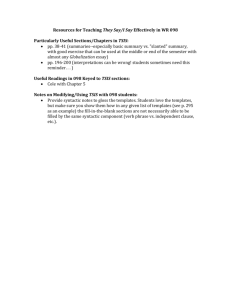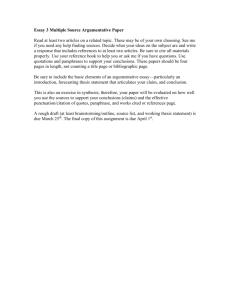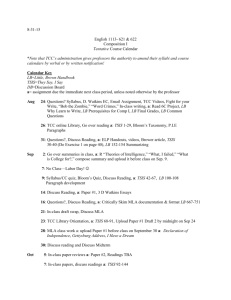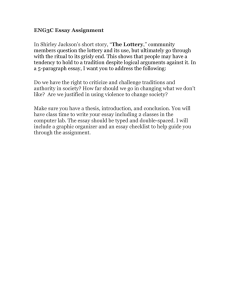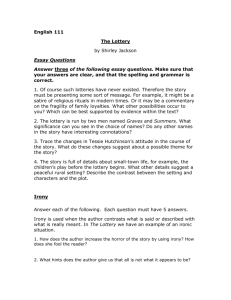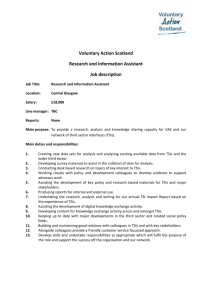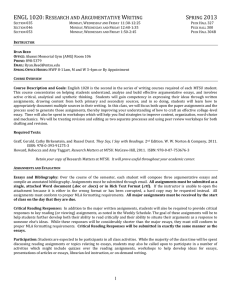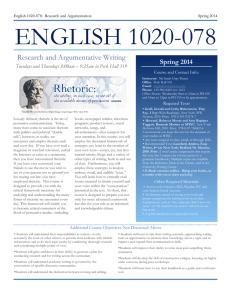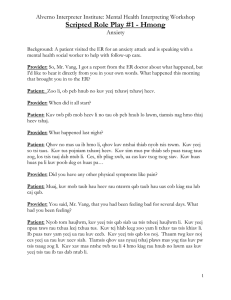Dr. Laura Dubek Summer Session IV, 2010 324 Peck Hall 10:10
advertisement
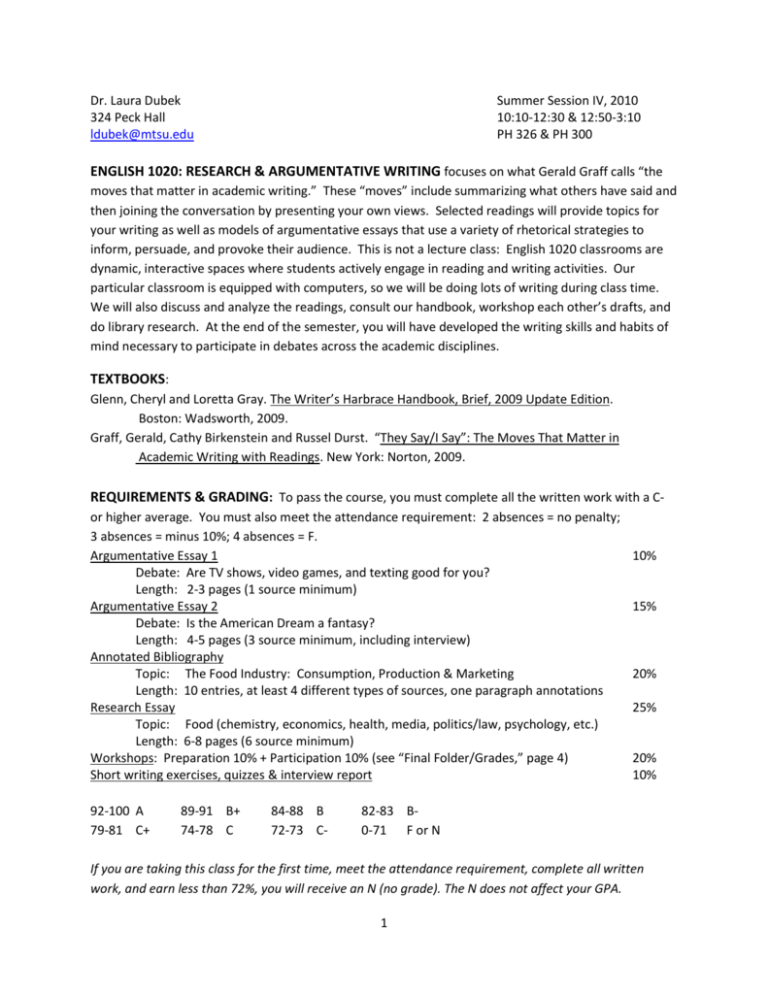
Dr. Laura Dubek 324 Peck Hall ldubek@mtsu.edu Summer Session IV, 2010 10:10-12:30 & 12:50-3:10 PH 326 & PH 300 ENGLISH 1020: RESEARCH & ARGUMENTATIVE WRITING focuses on what Gerald Graff calls “the moves that matter in academic writing.” These “moves” include summarizing what others have said and then joining the conversation by presenting your own views. Selected readings will provide topics for your writing as well as models of argumentative essays that use a variety of rhetorical strategies to inform, persuade, and provoke their audience. This is not a lecture class: English 1020 classrooms are dynamic, interactive spaces where students actively engage in reading and writing activities. Our particular classroom is equipped with computers, so we will be doing lots of writing during class time. We will also discuss and analyze the readings, consult our handbook, workshop each other’s drafts, and do library research. At the end of the semester, you will have developed the writing skills and habits of mind necessary to participate in debates across the academic disciplines. TEXTBOOKS: Glenn, Cheryl and Loretta Gray. The Writer’s Harbrace Handbook, Brief, 2009 Update Edition. Boston: Wadsworth, 2009. Graff, Gerald, Cathy Birkenstein and Russel Durst. “They Say/I Say”: The Moves That Matter in Academic Writing with Readings. New York: Norton, 2009. REQUIREMENTS & GRADING: To pass the course, you must complete all the written work with a Cor higher average. You must also meet the attendance requirement: 2 absences = no penalty; 3 absences = minus 10%; 4 absences = F. Argumentative Essay 1 Debate: Are TV shows, video games, and texting good for you? Length: 2-3 pages (1 source minimum) Argumentative Essay 2 Debate: Is the American Dream a fantasy? Length: 4-5 pages (3 source minimum, including interview) Annotated Bibliography Topic: The Food Industry: Consumption, Production & Marketing Length: 10 entries, at least 4 different types of sources, one paragraph annotations Research Essay Topic: Food (chemistry, economics, health, media, politics/law, psychology, etc.) Length: 6-8 pages (6 source minimum) Workshops: Preparation 10% + Participation 10% (see “Final Folder/Grades,” page 4) Short writing exercises, quizzes & interview report 92-100 A 79-81 C+ 89-91 B+ 74-78 C 84-88 B 72-73 C- 10% 15% 20% 25% 20% 10% 82-83 B0-71 F or N If you are taking this class for the first time, meet the attendance requirement, complete all written work, and earn less than 72%, you will receive an N (no grade). The N does not affect your GPA. 1 Daily Schedule 8 June 10 June 15 June 17 June 22 June 24 June TSIS: They Say/I Say WH: Writer’s Harbrace “They Say/I Say” exercise; syllabus quiz TSIS: 1-27; “Watching TV Makes You Smarter” 213-230; “Thinking Outside the Idiot Box” 231-235; “What’s the Matter with Kids Today?” 236-240; “Bart Simpson: Prince of Irreverence” 241-255; WH: Chapter 2 TSIS: 28-73; “Can You Hear Me Now?” 270-280; “Reality Television: Oxymoron” 293296; “Hidden Intellectualism” 297-303; WH: Chapters 1 & 3 WH: Chapter 4; Workshop & In-class revisions of Argumentative Essay 1 TSIS: 72-97; “The Growing Gulf Between the Rich and Rest of Us” 308-311; “The Truth About Wages” 312-315; “Inequality and the American Dream” 316-320; “Confronting Inequality” 322-339; WH: Chapter 7 TSIS: 101-122; “Up Against Wal-Mart” 342-354; “A More Perfect Union” 360-376; “The Growing College Gap” 378-390 29 June 1 July Interview Reports; Capitalism: A Love Story (part I of documentary) Interview Reports; Capitalism: A Love Story (part II of documentary) 6 July 8 July WH: Chapters 21 & 22; Workshop & In-class revisions of Argumentative Essay 2 TSIS: “Don’t Blame the Eater” 153-155; “What you Eat is Your Business” 157-160; “Lawsuits . . . to Combat Obesity” 162-170”; “Obesity: Much of the Responsibility Lies with Corporations” 172-180; “The Great Grocery Smackdown” (handout) 13 July 15 July TSIS: “Your Trusted Friends” 182-197; “Fat as a Feminist Issue” 200-204; “Being Fat is OK” 206-209; “Is Food the New Sex?” (handout); Food, Inc (part 1 of documentary) TSIS: 135-148; Food, Inc (part 2 of documentary) 20 July 22 July MEET IN LIBRARY: Room 272; WH: Chapters 8 & 9 WH: Chapter 10; In-Class Writing: Annotated Bibliography 27 July 29 July WH: Chapters 12-18; Workshop & Final Revision of Annotated Bibliography WH: Chapters 26-31; In-Class Writing: Research essay 3 August 5 August WH: Chapters 32-34; Workshop (Introduction) In-Class Writing & Workshop (Body Paragraphs) 10 August 12 August In-Class Writing & Workshop (Conclusion and Works Cited) Workshop & Final Revision of Research Essay 2 POLICIES Late Arrivals: I understand that sometimes you can’t avoid being late—flat tire, power outage, emergency doctor’s appointment—but consistently arriving late shows very poor commitment. Arriving more than 30 minutes late will equal ½ absence. Three tardies (less than 30 minutes each) will equal one absence. If I am ever late, you can disregard one of your own tardies to even the score. Late Papers: Due dates for each major writing assignment are marked in bold on your daily schedule. If you are absent on one of those days, your paper will not be late if you send it to me as an attachment via email before the end of the class period. I will accept one paper late, without penalty, provided it is submitted the following class period. Subsequent late papers will receive a maximum of 50 points. I do not accept papers submitted more than one week after the due date. Disruptive Behavior: If any of my electronic devices go off during class, if you see me texting or checking Facebook during class, or if I am disrespectful or aggressive in a way that makes you uncomfortable, you should report me to Judicial Affairs. Such behavior indicates that I do not take you or your education seriously. Plagiarism: Never download a paper and put your name on it. Do not cut-and-paste without using quote marks and citing your source. Always do your own work. Plagiarism will get you a zero for the assignment and, depending on the type and amount, may get you an F for the course. I report all instances of plagiarism to Judicial Affairs. Writing Center: The UWC (PH 325) opens for business on Monday, June 7th. Trained tutors are available Monday-Thursday to help you at any stage of the writing process. Make an appointment to clarify a thesis statement, generate content, integrate source material, or improve sentence structure and diction. Seeking assistance at the UWC shows strong commitment. 3 Final Folder/Grades: Grades tend to make people anxious. I have seen many students fall apart when faced with a grade that will lower a GPA and thus put financial aid in jeopardy. In this class, you will be graded according to the quality of your written work. While grades are not negotiable in the sense that you and I come to some sort of compromise regarding the assessment of this quality, you do “negotiate” your grade in the sense that each writing assignment is planned, drafted, workshopped, and revised. At every step in the process, you will have the opportunity to get feedback from me, your peers, and the tutors in the UWC (see page 2). Also, assignments are “weighted” in a way that should work to your advantage: the first assignment is worth only 10%; the last assignment is worth 25%. On Thursday, August 12th, you will present all your written work (including a self-assessment of your preparation and participation in all seven workshops) in a two-pocket folder for my assessment. Final grades will be posted on Monday, August 16th. Do you have a Lottery Scholarship? To retain Tennessee Education Lottery Scholarship eligibility, you must earn a cumulative TELS GPA of 2.75 after 24 and 48 attempted hours and a cumulative TELS GPA of 3.0 thereafter. You may qualify with a 2.75 cumulative GPA after 72 attempted hours (and subsequent semesters) if you are enrolled full-time and maintain a semester GPA of at least 3.0. A grade of C, N, F, or I in this class may negatively impact TELS eligibility. Dropping a class after 14 days may also impact eligibility; if you withdraw from this class and it results in an enrollment status of less than full time, you may lose eligibility for your lottery scholarship. Lottery recipients are eligible to receive the scholarship for a maximum of five years from the date of initial enrollment, or until a bachelor degree is earned. For additional Lottery rules, please contact the Financial Aid Office at 898.2830 or refer to your Lottery Statement of Understanding form, review lottery requirements on the web at http://scholarships.web.mtsu.edu/telsconteligibility.htm. Disability Statement: If you have a disability that may require assistance or accommodations, or if you have any questions related to any accommodation for testing, note taking, reading, etc., please speak with me as soon as possible. You may also contact the Office of Disabled Student Services at 898.2783 with any questions about such services. 4
